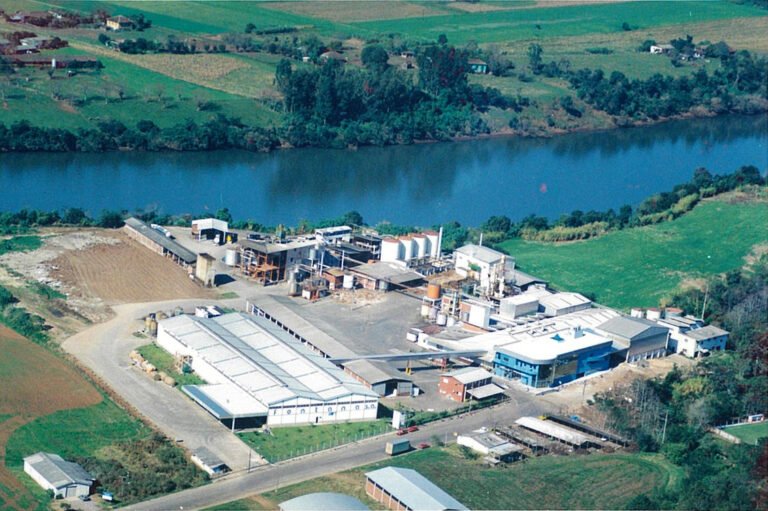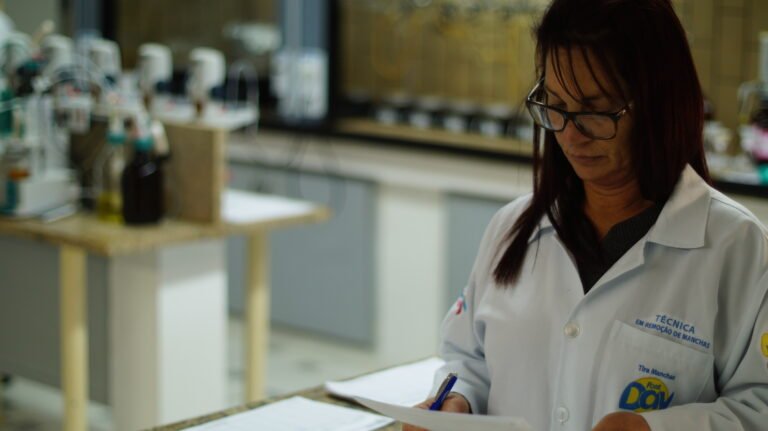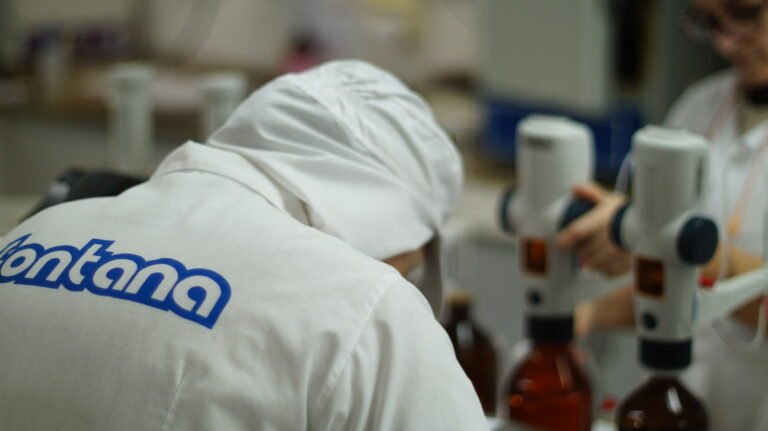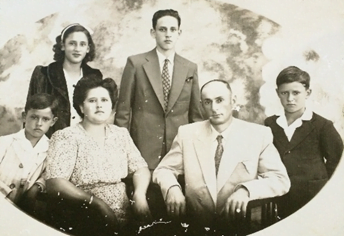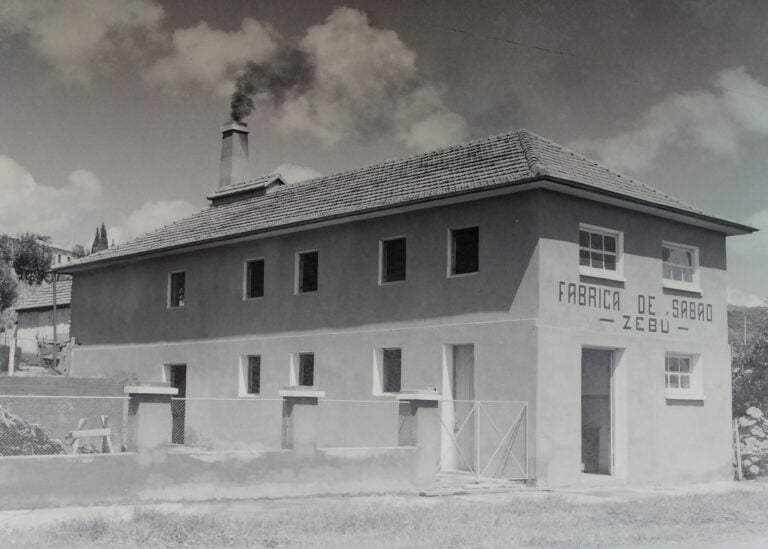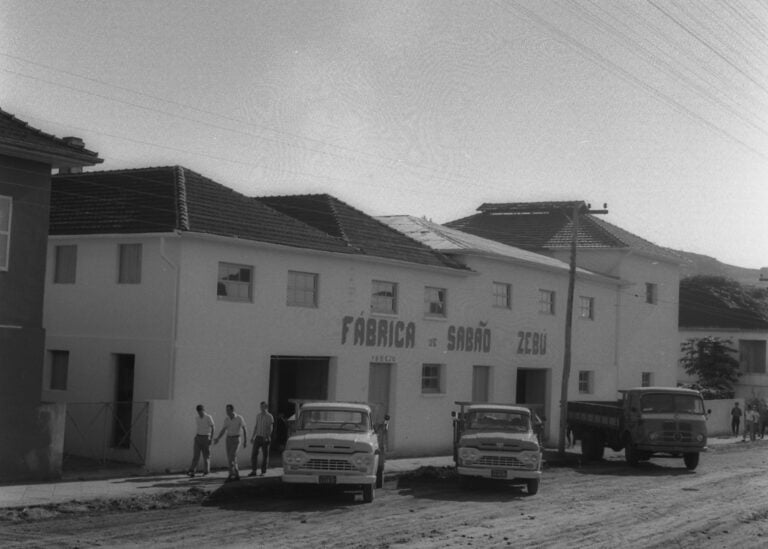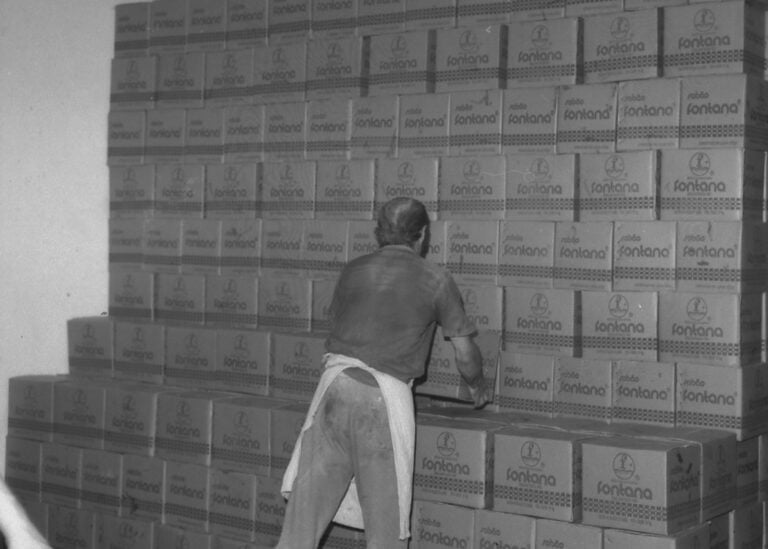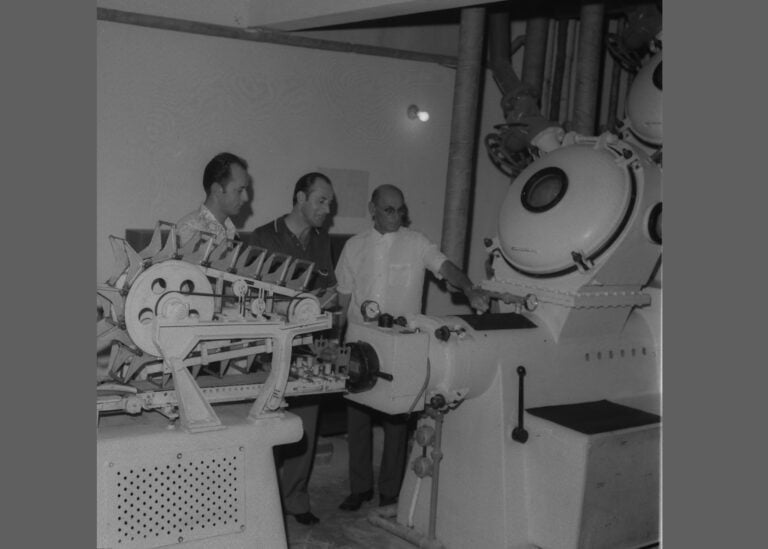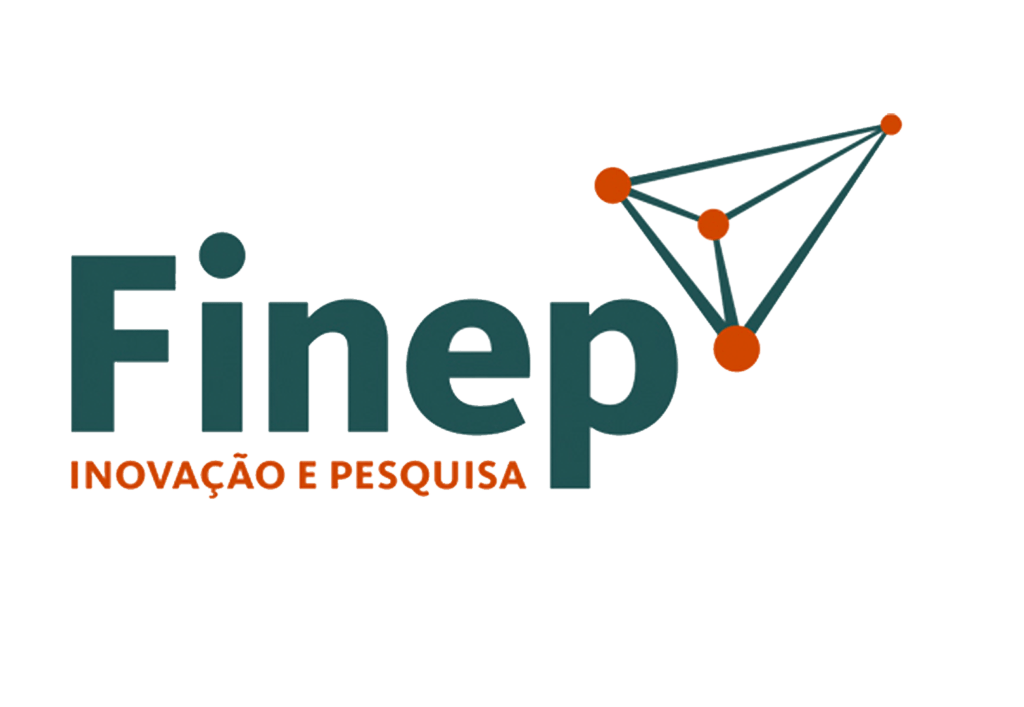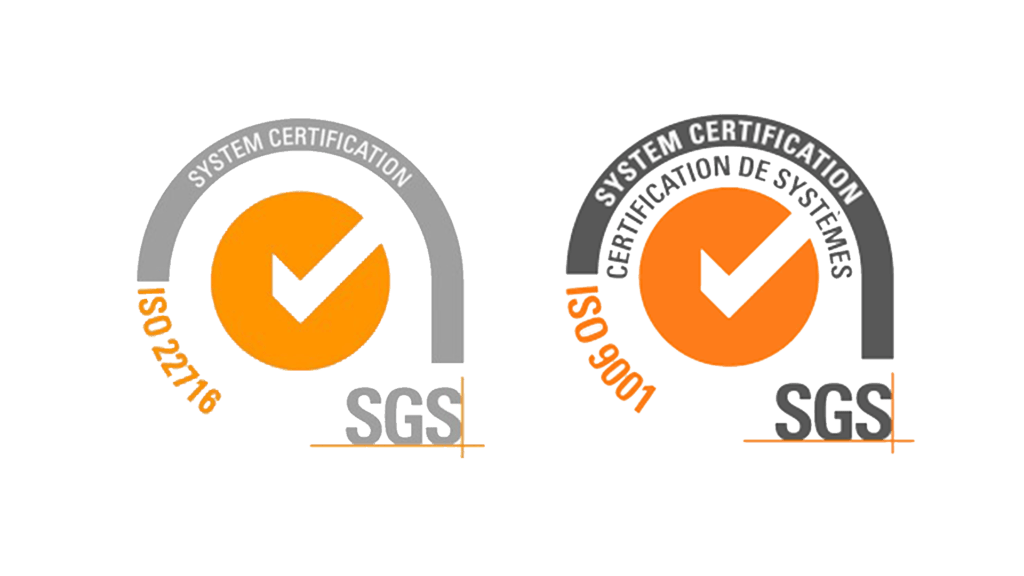
FONTANA S/A – A Success Story
Established in 1934 by Laura and Pedro Fontana. The young couple started as an individual company. Always believing in hard work, they insisted on occupying a market that, in those times, was very restricted and adverse. The chain supply difficulties and the little available capital of the family were not enough for them to give up on their dream: to be a producer and seller of soaps in this small region of southern Brazil.
“Zebu”, “Combate” and Laçador” were the first brands of bar soaps. Characterized as standard products of the time, they had a classic saponification formula (mixture of animal fat and caustic soda) meeting the needs of consumers.

Pedro Fontana and Laura Sanderson
Around 1958, the couple decided to hand over the company’s business to their sons Cezário and Dinarte Fontana, transforming the individual company into an LLC, under the name of “Fontana e Cia Ltda”.
The dynamism and vision of the business contributed to increase sales of products, new equipment, and technologies, developing the company. As of May 1979, it was renamed Fontana S/A.

Cesário Fontana and Dinarte Fontana
The different versions of colors, sizes, and packages; added to the commercial service, transformed the family business into a successful company.
In the 80’s the two brothers started to consolidated Fontana’s Company purpose: to be an important industry, totally Brazilian, in the field of Personal Care, Laundry Care and Household Products in Brazil. Producing bar soap through outsourcing contracts, for world-renowned brands as BDF Nivea, Johnson & Johnson, Davene, among others. All these skills raised the company to dynamic international markets. The development of new product lines improving values and innovative formulas, update presentations packs were and continue to be constant search for the company, its employees, and suppliers.
The biggest challenge for the third generation, which takes over the company in the 1990s: to professionalize without losing the characteristics inherited from its founders. Thus, the Company’s Management Board has two Managing Directors and a Board of Directors with three members. This administrative legal format ensures success for the company’s strategic plans and budgets.
Timeline

Pedro Fontana and Laura Sanderson set up in Encantado city the soap factory and later, to improve the family’s earnings and to take advantage of the honey surplus production in their county, they began to produce nougats and honey bread. The portfolio included hosted coffee that were sales with soap, improving the mix of products to be offered to the customers. The transport was made through carts pulled by donkeys
The area served, initially, was formed by the cities of the “Vale do Taquari River” and the region of the southern ridge “Serra Gaúcha”.
In Encantado City, for example, the first clients were very small traders, the school of the nuns and the hospital.
In 1943 was founded the “Fontana Wheat Mill LLC”, acquired by Pedro Fontana in partnership with other partners, demonstrates the entrepreneurial spirit of Pedro. In 1947, Pedro sold his shares and reinvested in the soap company. Today “Moinhos Cruzeiro do Sul” and “Pena Branca Alimentos” is one of the largest grinder complexes in Brazil.
Pedro and Laura Fontana had four children: Jaime, Joice, Cezario and Dinarte. Only Cezario and Dinarte remained into business.
In 1958, Cezario and Dinarte, with few employees, took over the company taking turns between production, administration, and sales.

The phase of technological modernization begins, in which the company stops producing soap in tanks and starts drying soap through extruders in a continuous process.
Sales, at this time, already reach the entire state of Rio Grande do Sul and part of Santa Catarina and Paraná.
The deliveries were already made by trucks and start to appear the company’s first own vehicles for delivery.
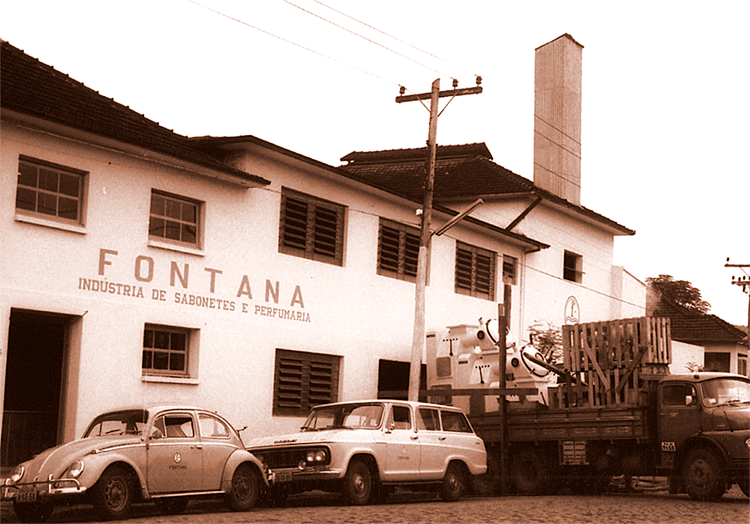
The production and marketing of bar soaps, blonde glycerin and bi-distilled glycerin begins. The product’s portfolio adds first Chemicals in addition to existing soaps.
In 1979 the legal status of the company was changed from Fontana & Cia. Ltda. to Fontana S.A.
The factory is expanded with the acquisition of new equipment for soap drying.
Following the group’s business diversification plan, begins the entry into livestock farming with farms in northern Brazil. Dinarte moves with his whole family to run the new business.
Strong presence of outsourcing and private label production in the company’s sales (reaching 70% - own 30% in Rio Grande do Sul, Santa Catarina, and Paraná) producing for large national and multinational companies such as Johnson & Johnson, BDF Nivea, Davene, Stiefel Lab., Procter & Gamble, Elida Gibbs (UniLever), Abbott and York Labs.

The production of own brands/private labels brought many benefits in terms of knowledge of the best and most up-to-date manufacturing techniques of the time, which were already part of the day-to-day life of these large companies.
Acquired wide area for the transfer of the production of soaps from the Antonio de Conto Ave. to a wider area, in the same city of Encantado. The production of soaps was expanded by the acquisition of three more production lines.
New changes were made, automation and acquisition of new equipment (racks, stamps, and extruders).

Construction of the fat splitting and distillation plants, which was the embryo of Fontana's entry into the oleochemicals area.
A very strong work begins involving restructuring the product line and opening the market in Brazil (hiring new sales team).
The participation of private labels brands in the company's numbers is rebalanced with the company's own brands, reversing previously scores.
Fontana manages to be in markets previously only frequented by big brands, starting to be present in large retail and wholesale customers throughout Brazil.
In November 1996, Fontana is certified to ISO 9001.
It also intensifies investment in a new business activity for the company: the production of liquid detergent.
2000s – The company currently has two production units:
Consumer Products: Laundries: Bar Soaps, Liquids Detergents, Stain Remover, Fabric Softeners. Household: Dishwasher and Multipurpose Cloths; Kitchen and Bathroom Cleaners; Air and Sanitary Cleaners; Anti-Mold. Personal Care: Soaps in different formulations: Liquids, Bars, Antibacterial, Moisturizers, Organics, Glycerin, with Extracts and Fines Fragrance; for all Family, for Children and Mature Skin.
Oleochemicals: Glycerin, Hydrogenated Fat, Oleic Acids, Stearic Acids, Soap Base Noodles, Esters, produced from animal fats or vegetable oils.
With annual sales of around 37 MM euros, it is one of the main Brazilian Manufactures of Personal Care/Laundry Products and a strong Oleochemical Provider.
Its products are in several countries around the world: Uruguay, Argentina, Paraguay, Bolivia, Peru, Colombia, Cuba, Venezuela, Dominican Republic, Haiti, Russia, China, Ivory Coast, USA.
The Headquarter and Industry Plant are located in Encantado City/RS. A new Unit in Palmeiras de Goiás/GO is under implementation. A large network of exclusive distributors, costumers, reatils, and Fontana’s commercial warehouses complete the Commercial Structure in the cities of Campo Grande/MS, Itapecerica da Serra/SP, Salvador/BA and Recife/PE.

The matriarchs
Even with the great professionalization of the company, the recognition of the successful trajectory of Pedro, Cesário and Dinarte is still present in the active participation of their wives on the Fontana Board of Directors. A recognition of their roles as co-founders and respect for their trajectories.
The Matriarchs, Glacy Fontana and Dejamira Fontana, are fundamental in decision-making and in directing them with a view to the future.

Glacy Ana Fontana
Determination and firmness are some of the hallmarks of the 80-year-old shareholder and matriarch, Glacy Ana Fontana. In addition to following the company's development alongside her husband Dinarte, she witnessed the entrepreneurial vision of her parents-in-laws, Pedro and Laura, who in the 1930s started the production of soaps. Today, as a member of the Board of Directors, Glacy participates in the meetings and helps to define the strategic planning, which guides the company's principles. Currently, Fontana is managed by his son Mauricio and his nephew Ricardo.

Dejamira Lurdes Fontana
It was in Taquara, in Putinga Town, a small County that belonged to Encantado, that Dejamira Lurdes Fontana was born and lived until he was 13 years old. He finished elementary school, finished high school at Colégio Madre Margarida and started her studies in the accounting area, which was common at that time. Daughter of Angelo Cirillo Pretto and Armelinda De Mari Pretto has always been dedicated to the home. "My parents founded “Neusa’s clothing knitting company”, to be a family business for their children. My responsibilities were to do the housework, cooked and took care of my two younger brothers in the morning and go to school in the afternoon", she remembers.
We are a team of 98 sales representatives, 25 exclusive distributors, presenting our consumer products to 28,800 registered customers where around 15,000 are regular buyers. At the headquarters in Encantado, 230 employees are prepared to understand the needs of our customers and provide the necessary support for our sales force.
December 2017 marks the beginning of the implementation of a new industrial unit in the state of Goiás/Brazil. Over the next few years, it will start operations, consolidating the technological expansion included in the Company’s Internationalization Plan.
Fontana Paraguay S/A, established in January 2017, marks the company’s internationalization and business development across borders. It improves with the expansion of distributors in the countries of South and Central America, in addition to the northern and central western states of Brazil.
Fontana highlights the importance of the Quality Control System within the requirements and standards according to international rules, including ABNT ISO 9001, ISO 22716, ESG Standards in addition to the Resolutions of the Health Authorities of the countries where it operates, especially ANVISA/Brazil.
The Quality Policy includes the following objectives: Satisfaction of external consumers, understanding their needs and expectations; Maintain partnership with suppliers; Continuous improvement in its processes through quality indicators and the Good Practices Manual; Train and educate your employees with effective training.
Caring for the Environment: Ranked among the 10 best companies in the state of Rio Grande do Sul in terms of environmental care, with a considerable reduction in the production of industrial waste and sending packaging materials for recycling.
Laura Fontana Foundation: A Tribute to the company’s founder, aims at social, cultural, and recreational interaction for its members. Created in October 1986, its headquarters is in the city of Encantado, and its mission is to develop the quality of life of its members through educational and financial programs support.
